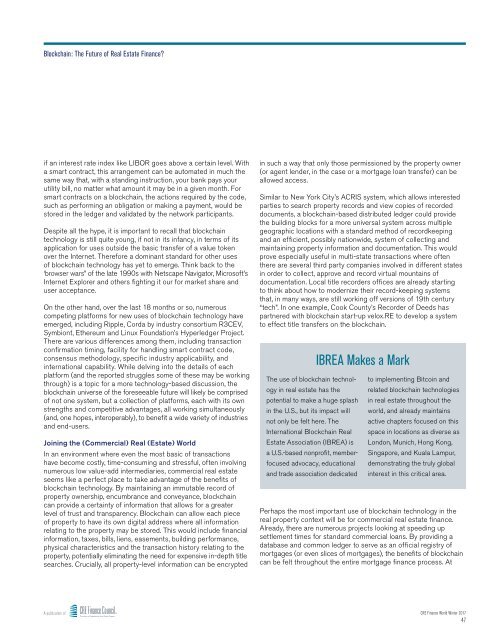CRE FinanCE W Rld
CREFW-Winter2017
CREFW-Winter2017
You also want an ePaper? Increase the reach of your titles
YUMPU automatically turns print PDFs into web optimized ePapers that Google loves.
Blockchain: The Future of Real Estate Finance?<br />
if an interest rate index like LIBOR goes above a certain level. With<br />
a smart contract, this arrangement can be automated in much the<br />
same way that, with a standing instruction, your bank pays your<br />
utility bill, no matter what amount it may be in a given month. For<br />
smart contracts on a blockchain, the actions required by the code,<br />
such as performing an obligation or making a payment, would be<br />
stored in the ledger and validated by the network participants.<br />
Despite all the hype, it is important to recall that blockchain<br />
technology is still quite young, if not in its infancy, in terms of its<br />
application for uses outside the basic transfer of a value token<br />
over the Internet. Therefore a dominant standard for other uses<br />
of blockchain technology has yet to emerge. Think back to the<br />
‘browser wars” of the late 1990s with Netscape Navigator, Microsoft’s<br />
Internet Explorer and others fighting it our for market share and<br />
user acceptance.<br />
On the other hand, over the last 18 months or so, numerous<br />
competing platforms for new uses of blockchain technology have<br />
emerged, including Ripple, Corda by industry consortium R3CEV,<br />
Symbiont, Ethereum and Linux Foundation’s Hyperledger Project.<br />
There are various differences among them, including transaction<br />
confirmation timing, facility for handling smart contract code,<br />
consensus methodology, specific industry applicability, and<br />
international capability. While delving into the details of each<br />
platform (and the reported struggles some of these may be working<br />
through) is a topic for a more technology-based discussion, the<br />
blockchain universe of the foreseeable future will likely be comprised<br />
of not one system, but a collection of platforms, each with its own<br />
strengths and competitive advantages, all working simultaneously<br />
(and, one hopes, interoperably), to benefit a wide variety of industries<br />
and end-users.<br />
Joining the (Commercial) Real (Estate) World<br />
In an environment where even the most basic of transactions<br />
have become costly, time-consuming and stressful, often involving<br />
numerous low value-add intermediaries, commercial real estate<br />
seems like a perfect place to take advantage of the benefits of<br />
blockchain technology. By maintaining an immutable record of<br />
property ownership, encumbrance and conveyance, blockchain<br />
can provide a certainty of information that allows for a greater<br />
level of trust and transparency. Blockchain can allow each piece<br />
of property to have its own digital address where all information<br />
relating to the property may be stored. This would include financial<br />
information, taxes, bills, liens, easements, building performance,<br />
physical characteristics and the transaction history relating to the<br />
property, potentially eliminating the need for expensive in-depth title<br />
searches. Crucially, all property-level information can be encrypted<br />
in such a way that only those permissioned by the property owner<br />
(or agent lender, in the case or a mortgage loan transfer) can be<br />
allowed access.<br />
Similar to New York City’s ACRIS system, which allows interested<br />
parties to search property records and view copies of recorded<br />
documents, a blockchain-based distributed ledger could provide<br />
the building blocks for a more universal system across multiple<br />
geographic locations with a standard method of recordkeeping<br />
and an efficient, possibly nationwide, system of collecting and<br />
maintaining property information and documentation. This would<br />
prove especially useful in multi-state transactions where often<br />
there are several third party companies involved in different states<br />
in order to collect, approve and record virtual mountains of<br />
documentation. Local title recorders offices are already starting<br />
to think about how to modernize their record-keeping systems<br />
that, in many ways, are still working off versions of 19th century<br />
“tech”. In one example, Cook County’s Recorder of Deeds has<br />
partnered with blockchain start-up velox.RE to develop a system<br />
to effect title transfers on the blockchain.<br />
The use of blockchain technology<br />
in real estate has the<br />
potential to make a huge splash<br />
in the U.S., but its impact will<br />
not only be felt here. The<br />
International Blockchain Real<br />
Estate Association (IBREA) is<br />
a U.S.-based nonprofit, memberfocused<br />
advocacy, educational<br />
and trade association dedicated<br />
IBREA Makes a Mark<br />
to implementing Bitcoin and<br />
related blockchain technologies<br />
in real estate throughout the<br />
world, and already maintains<br />
active chapters focused on this<br />
space in locations as diverse as<br />
London, Munich, Hong Kong,<br />
Singapore, and Kuala Lampur,<br />
demonstrating the truly global<br />
interest in this critical area.<br />
Perhaps the most important use of blockchain technology in the<br />
real property context will be for commercial real estate finance.<br />
Already, there are numerous projects looking at speeding up<br />
settlement times for standard commercial loans. By providing a<br />
database and common ledger to serve as an official registry of<br />
mortgages (or even slices of mortgages), the benefits of blockchain<br />
can be felt throughout the entire mortgage finance process. At<br />
A publication of <strong>CRE</strong> Finance World Winter 2017<br />
47


